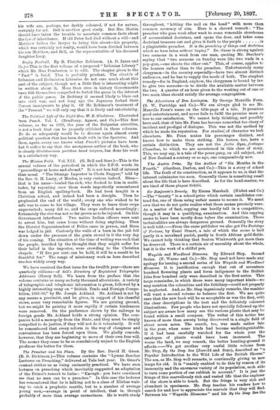The Mission Field. Vol. %LI. (G. Bell and Sons.)—This is
the annual volume of the periodical in which the S.P.G. words its "proceedings at home and abroad." It is not less full of interest than usual "The Strange Impostor in Chota Nagpur," told by the Rev. G. H. Lusty, of Murhu, is very curious indeed. Birsa- that is his name—healed the sick, who flocked to him in multi- tudes, by repeating over them words imperfectly remembered from an English spelling-book. He had been taught in a Christian school, and indeed had been a disciple. Then he prophesied the end of the world ; every one who wished to be safe was to come to his village. They were to leave their crops unprotected ; many did so, and the crops suffered accordingly ; fortunately the rice was not so far grown as to be injured. On this Government interfered. Two native Indian officers were sent to arrest him, but came home without doing anything. Then the District Superintendent of Police came in person, and Birsa was lodged in jail. Curiously the walls of a barn in the jail fell down under the pressure of the grain stored in it the very day of his coming. The situation at the time of writing was such that the people, terrified by the thought that they might suffer for their belief in the impostor, were crowding to the Christian chapels. "If five per cent. can be held, it will be a result to be thankful for." The range of missionary work as here described reaches widely every way.
We have received the first issue for the twelfth year—there are quarterly editions—of Sell's _Directory of Registered Telegraphic Addresses (Henry Sell). We learn from the preface that the volume contains as many as forty thousand alterations. A variety of telegraphic and telephonic information is given, followed by a highly interesting essay on " British Trade and Foreign Compe- tition, 1895-96," by Mr. Joseph Ackland, Mr. Ackland is not by any means a pessimist, and he gives, in support of his cheerful views, some very remarkable figures. We are gaining ground, but we might be gaining it more rapidly if certain hindrances were removed. On the preference shown by the railways to foreign goods Mr. Ackland holds a strong opinion. The com- panies hold a monopoly from the State, and they must be simply compelled to do justice, if they will not do it voluntarily. It will be remembered that every reform in the way of cheapness and convenience has been forced upon them. We gladly concede, however, that they are beginning to move of their own free will. The sooner they cease to be so scandalously unjust to the English producer the better for them.


































 Previous page
Previous page